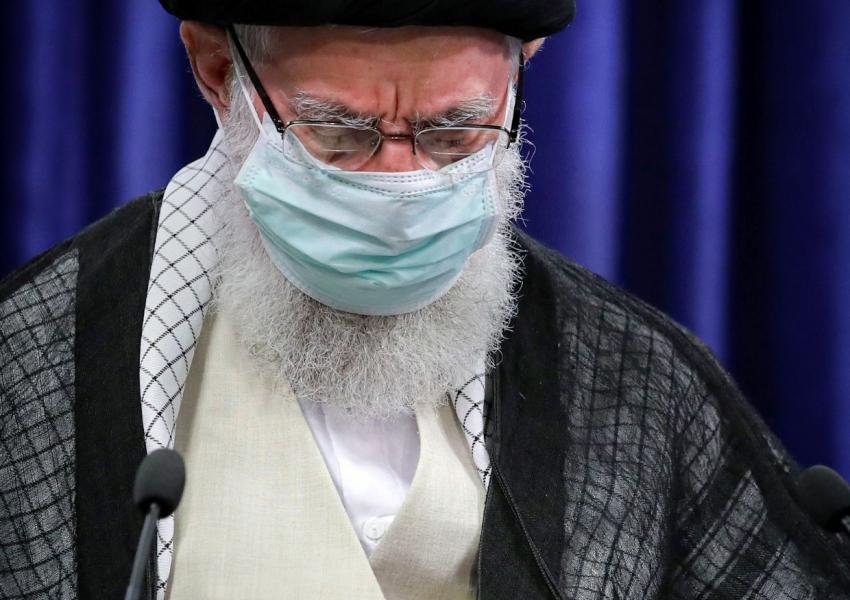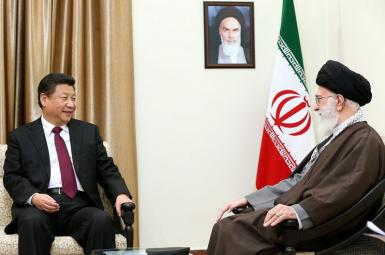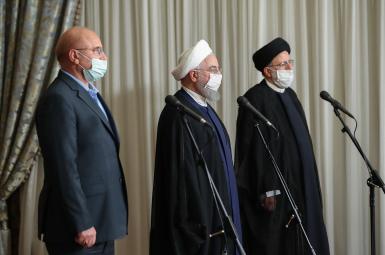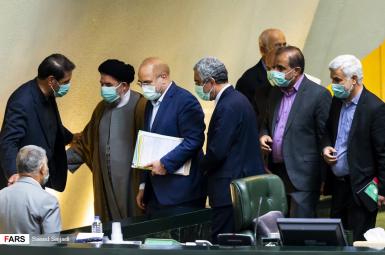
Khamenei Reiterates 'Referendum In Palestine', Avoids Mention Of Nuclear Talks In Speech
In a speech to mark the last Friday of Ramadan and the "Qods Day", the Islamic Republic's Supreme Leader Ali Khamenei has called for a referendum to determine "the political system of Palestine."
Ironically, Khamenei has been strongly opposing the idea of any referendum in Iran during the past 30 years although at least two of the country's presidents, Mahmoud Ahmadinejad and Hassan Rouhani, have called for a referendum to resolve key political and economic issues and to put an end to the ongoing political deadlock in Iran.
Khamenei said on Friday, May 7: "Palestinian warriors can bring up the idea of holding a referendum with the participation of the main inhabitants of Palestine. The referendum will determine the political system of the country and its main inhabitants, including the displaced Palestinians, no matter what their ethnicity and religion."
He added that the resulting "political system will bring back the displaced Palestinians and will determine the fate of the foreigners inhabiting there," meaning the Jewish citizens of Israel. However, he did not explain what entitles him to intervene in the domestic political affairs of a foreign country.
Expressing support for Palestinians militant groups' armed confrontation with the state of Israel, Khamenei said: "The endeavors of Palestinians and the pure blood of the Resistance martyrs have managed to hold up this auspicious flag and to increase the internal power of Palestinian jihad by a hundred times," adding that "One day, the Palestinian youth used to defend themselves by throwing stones, but today, they respond to enemy attacks with precision missiles."
Iran is believed to be the main supplier of money, weapons and missile technology to militant groups in Gaza that often enter into confrontation with Israel and fire missiles.
Meanwhile, Khamenei in his own typical way offered a biased account of the history of the region and blamed the former Soviet Union and the "capitalist world" for paving the way for the "occupation of Palestine."
Going back to what many say is his wishful thinking about the imminent annihilation of Israel, he reiterated: "I tell you with confidence: The downward movement of the Zionist regime has started, and it will not stop."
During the week, Ali Shirazi, Khamenei's representative to Sarallah Headquarters, an IRGC unit responsible for Tehran’s security said: "We can destroy Israel within 24 hours." Earlier, IRGC Commander Hossein Salami had also threatened "recent blasts in Israel's sensitive centers can continue in a domino effect."
This was the second speech by Khamenei in less than a week in which he did not refer to the ongoing negotiations with Europe and the United States to restore the 2015 nuclear deal. He has apparently chosen to keep silent on the matter as Iranian negotiators have said an end to the talks is imminent as the two sides have started drafting a new text.
Like always, Khamenei is probably trying to distance himself from the negotiation so that he can go back to his anti-US posture when the deal is done. Both this round of talks and the negotiations in 2014 and 2015 with the US were made possible only with the authorization of Khamenei. US Secretary of State Antony Blinken also said this week that the United States is well aware that Khamenei has the final say about everything.
Nonetheless, Khamenei who usually indulges in badmouthing the United States at every opportunity has been conspicuously silent during the past two weeks to let the negotiations go forward as smoothly as possible.
Khamenei's recorded speech, which he read out from a paper, was unusually brief on Friday: Ten minutes in Persian and another 10 minutes in Arabic. And while the media expected him to expound on the nuclear negotiations and the upcoming election in Iran, he did not touch upon those matters.








